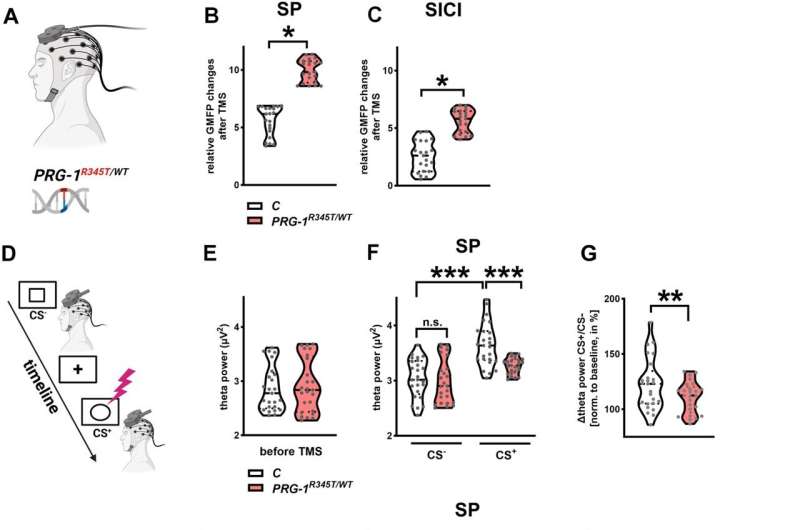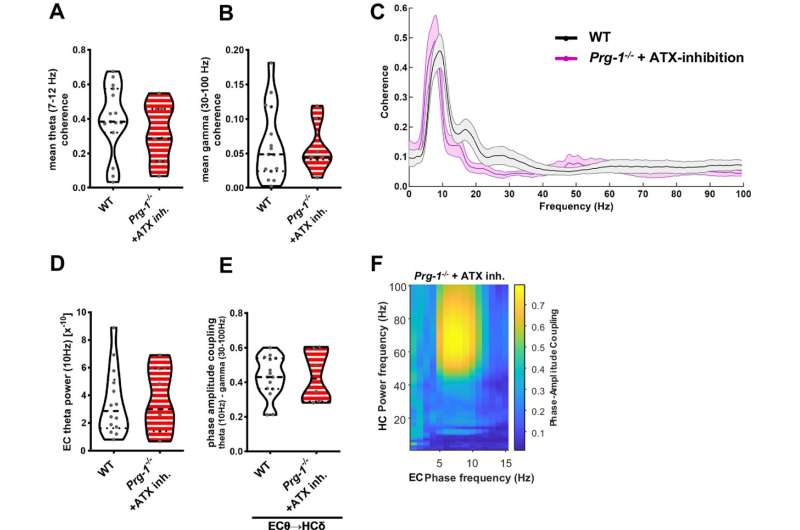This article has been reviewed according to Science X's editorial process and policies. Editors have highlighted the following attributes while ensuring the content's credibility:
fact-checked
peer-reviewed publication
trusted source
proofread
The body's own lipids affect mental disorders: Can specific inhibitors help?

A genetic disorder leads to an increase in bioactive lipids in the brain, resulting in an imbalance between excitation and inhibition in neural circuits and promoting mental disorders. However, treatment with an enzyme inhibitor that prevents the activation of lipids can restore balance and alleviate symptoms.
Increased levels of bioactive lipids produced naturally in the body, which affect excitatory transmission between brain cells, promote mental disorders. However, this mechanism can be rebalanced by treatment with an inhibitor that prevents the activation of these lipids in the brain. That is the result of a recent study on the correlation between synaptic lipid signals in the brain and mental disorders.
The results of the study "Altered cortical synaptic lipid signaling leads to intermediate phenotypes of mental disorders" have now been published in Molecular Psychiatry and could create new opportunities for the treatment of mental illness.
The teams led by Johannes Vogt (MD) at the Department of Molecular and Translational Neurosciences at the University of Cologne, Robert Nitsch (MD, Ph.D.) at the Institute of Translational Neuroscience at the University of Münster and partners at other universities investigated the role of the enzyme autotaxin and its opponent, the protein PRG-1, in regulating the balance between excitation and inhibition in the brains of humans and mice.
The research was carried out within the framework of Collaborative Research Centre 1451 "Key Mechanisms of Motor Control in Health and Disease" (speaker: Professor Dr. Gereon Fink, University of Cologne).
The project under the leadership of Vogt and Nitsch within the CRC deals with the balance between excitation and inhibition in the brain and its effect on motor function. This balance plays an important role in mental disorders. In the case of excitation, neural circuits cause information to be passed on and other neurons to be activated; in the case of inhibition, this information transfer is interrupted.

The project groups in Cologne and Münster had already shown in previous studies that the body's own lipids in the brain are activated by the enzyme autotaxin and stimulate nerve cell activity at the central checkpoint of signal transmission, the cortical synapse. As a result, they alter information processing in the brain's networks.
In the current study, the researchers analyzed the functional consequences of altered signal balance in 25 individuals induced by the antagonist of autotaxin, which reduces the activated lipids at the synapse. Using various methods for measuring brain waves and brain activity as well as psychological tests, they found specific changes that also occur in patients, so-called intermediate phenotypes of mental disorders. This means, for example, that comparable patterns of brain activation can be found in both patients and their clinically healthy relatives.
Additional studies in the mouse model revealed that animals with a similar genetic disorder showed comparable symptoms: increased anxiety, a depressive phenotype and lower stress resilience. Synchronization and information transfer between brain areas was similarly altered in humans and mice.
"The study indicates that the regulation of excitation and inhibition by synaptic lipid signals plays a crucial role in the development of mental disorders," said Professor Vogt.
Autotaxin is the key enzyme of lipid activation in the brains of mice and humans. The increased excitation state of the networks caused by the genetic disorder could be restored by administering specific inhibitors of autotaxin. According to the researchers, these findings open up new perspectives for the diagnosis and treatment of such disorders.
"Targeted modulation of synaptic lipid signals using autotaxin inhibitors that can reach the brain could open up possibilities to treat mental disorders," concluded Professor Nitsch. In future studies, the researchers plan to further investigate these approaches and to test their effectiveness and safety in clinical trials.
More information: Oliver Tüscher et al, Altered cortical synaptic lipid signaling leads to intermediate phenotypes of mental disorders, Molecular Psychiatry (2024). DOI: 10.1038/s41380-024-02598-2




















